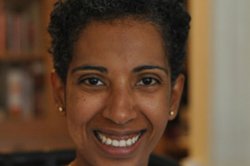María Cioè-Peña
Assistant Professor, Teaching and Learning
Posted in: Spotlights, Teacher Education Spotlights

What was your college experience like?
Not only was I a city kid who went to school in Upstate NY, but I also went to college at a young age so there were a lot of adjustments for me. I struggled to make friends because I didn’t really fit into any set “group” I wasn’t Black – or shared in the US Black experience; I also wasn’t a Latinx person from the Bronx or Upper Manhattan (where a great deal of Spanish-speaking Caribbean immigrants had settled at the time), I also had had a very sheltered life so I hadn’t had many experiences with sex, drugs or alcohol.
At first, I was so hungry to fit in that I socialized as much as I could. I contorted myself into different versions of myself just to find a community. This means that I was part of the Black Student Union, I was part of the La Familia Latina, I was part of the Young Republicans and I pledged for a sorority. I stopped calling home and checking in with my family – they represented the past and I was trying to move into the future. It also didn’t help that I knew that while I was at college my mom, who was a single parent, was struggling. So, in order to connect and to forget, I started partying. A LOT. As a result of all this, I lost sight of school and I started failing my classes. I ended my freshman year on probation. This was a source of great shame for me. In addition, a lot of the relationships I had fell apart, after all they weren’t built on genuine connections but rather in my attempts to be “likeable.”
Being on probation, meant that my financial aid would be in jeopardy. That realization was like a wake up call. I wont say that I immediately became a super studious person but I did try harder. I tried to focus a bit more, to make strides to raise my grades and I sought community in people who wanted to find balance. I found people who were struggling to make sense of the world at school with the world at home. I got lucky, I found that. It was a small circle – we were just three girls – but it was enough. To this day, we still call on each other to celebrate our success but also to mourn our losses, to heal and to regroup. This in no way means that college was suddenly a breeze, it just meant that I had enough of support system as to be able to graduate somewhat intact. I was the first person in my family to graduate from middle school so I had very little preparation with regards to what to expect from college, much less how to be successful there. My family also had no idea what I was going through so they didn’t really have a sense of how to support me. So while I didn’t necessarily thrive, I did survive.
Did you go to college with the intention of being a professor? If not, how did your path bring you here?
I did not. I didn’t even intend to be in the field of education which is ironic because SUNY-Cortland is one of the oldest Normal Schools (and teacher training institutions) in the state. I went to college with the intention of being a lawyer. Once there, I decided to go into publishing. When I graduated, I was on the waiting list for a publishing program at NYU. While I waited to hear, a friend asked me to sub at her preschool. That led to a career in education. After getting my master’s in education, I became a bilingual special education teacher and worked at a local elementary school in the same neighborhood where I had immigrated to in Brooklyn. After nine years in the field of education, I decided that I wanted to take some time off from the classroom to explore issues that I had encountered in my teaching practice. I had been very fortunate to have participated in a master’s program that encouraged inquiry, this was a practice I was able to maintain as a classroom teacher but wasn’t necessarily able to devote myself given all of my other responsibilities. Once in graduate school, I realized that as a professor I could continue to foster my love of teaching while supporting my desire and need for inquiry through research.
What is one thing you wish you had known in your undergraduate/graduate career? Why?
I wish I had known that questions are the way we learn. In most of my classes, I felt so intimidated to ask questions because I always suspected that everyone else knew what they needed to know. However, the longer I’ve been in school the more I realize that we are all just figuring/finding our way. Ultimately, asking questions is not a sign of weakness or lack of intelligence. It’s a sign that you are invested, that you want to know more, to be better. After all, I’ve made a career out of asking questions; all the professors have.
What is the best part about being an MSU faculty member?
I really love being part of such a diverse intellectual community. There are so many opportunities not only for me to share my work but to learn about other researchers and to collaborate with them. I have also really enjoyed working with MSU students. So far, I’ve met so many engaged and dedicated students. Students who like me are just trying to be the best version of themselves while negotiating a changing world. I also really appreciate that they have experiences that are different than mine (a Latinx immigrant who grew up in NYC) and that difference is constantly pushing me to grow and expand not only my teaching practice but also my own perception and understanding of the world.
What does a typical day look like for you?
I usually wake up around 5:30 am and check emails, at 6:30 I get up and make breakfast for my kids (2yo & 4yo). I try to go out for a run by 7am so that I can be back by 8, shower and walk my kids to school. From 9:30-12:30 I either do some writing or I plan for my classes, depending on the day. If I’m not teaching, I always try to pick my daughter up from school, after we have lunch together she takes a nap and I have another 30 minutes to check and respond to emails before my afternoon meetings. From 2-5, if I’m not teaching, I usually meet with other colleagues to talk about our research, new projects or just to check in and have some accountability around writing projects, or I meet with students. By 5 pm, I am usually making dinner and hanging out with my kids. From 7-8, after they go to bed, I check emails one last time. From then on I try to check out some documentary or catch up on the news. I try to go to bed by 10pm; unless it’s a Wednesday in which case I teach till 10:45pm so I won’t be in bed until 12:30am-1am.
What are a few of your recent accomplishments?
Over the summer, I was selected as a community-engaged teaching fellow at the university. I also recently published a book chapter with the parent of a former student of mine from when I was an elementary school teacher.
What is your favorite class to teach at MSU? Why?
I really love to teach 502/279 because it’s one of those courses in which the students and I get to challenge our understanding of power and privilege not only in relation to race, class, and gender but primarily in relation to dis/ability. It’s a wonderful opportunity to highlight the ways in which the marginalization of people can feel so natural but the moment you learn of it, it’s nearly impossible to ignore. It’s also an opportunity to show that oppression happens in ways that are big and small and that all of us in some way, shape or form contribute to (and often, benefit from) the marginalization of others. But more than that this course is an opportunity for us to figure out not just how to be allies but co-conspirators.
What advice would you give to incoming students in order for them to succeed?
Don’t be afraid to ask for help. There are tons of resources available on campus, ask around, find and get what you need. You belong here as much as anyone else, let us help you thrive.
